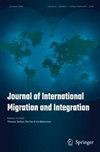“欢迎空间”:边缘地区的移民和新社区
IF 1.8
Q3 DEMOGRAPHY
Journal of International Migration and Integration
Pub Date : 2023-10-12
DOI:10.1007/s12134-023-01092-y
引用次数: 0
摘要
非城市地区移民的存在主要与限制性移民政策和欢迎举措扩散的矛盾共存有关。这些倡议旨在(共同)创造“欢迎空间”,通常由老年居民和外来人口推动,但也可能是地方政府、非政府组织和企业倡议的结果。这篇文章介绍了这些举措的潜力和局限性,以创造混合形式的招待和前景,以促进当地发展。它首先从国际和国家的角度反思了欢迎空间的政治相关性及其治理。其次,它反映了欢迎和好客的社会和叙事意义。考虑到欢迎空间的政治维度和话语维度之间的交叉点,最后建议认识到好客的集体维度,并为重新构想非城市地区的欢乐空间创造基础,以维持更公平和更具包容性的社会。本文章由计算机程序翻译,如有差异,请以英文原文为准。
“Welcoming Spaces”: Migration and New Communities in Marginalised Regions
Abstract The presence of migration in non-urban areas is mainly related to the paradoxical coexistence of both restrictive migration policies and a proliferation of welcoming initiatives. These initiatives are aimed at (co-)creating “welcoming spaces” and are often driven by older residents and migrant people but can equally be the outcome of initiatives by local governments, NGOs, and businesses. This contribution introduces the potentialities and limits of these initiatives to create hybrid forms of hospitality and prospects to enhance local development. It opens with a reflection on the political relevance of welcoming spaces and their governance from an international and national perspective. Second, it reflects upon the social and narrative significance of welcoming and hospitality. Considering the intersections between the political and the discursive dimension of welcoming spaces, it closes with a recommendation to recognise the collective dimension of hospitality and to create the basis for re-imagining spaces of conviviality in non-urban areas to sustain fairer and more inclusive societies.
求助全文
通过发布文献求助,成功后即可免费获取论文全文。
去求助
来源期刊
CiteScore
2.70
自引率
7.70%
发文量
82
期刊介绍:
The Journal of International Migration and Integration (JIMI) is a multidisciplinary peer-reviewed scholarly journal, which publishes original research papers, policy discussions and book reviews that enhance the understanding of immigration, settlement and integration and that contribute to policy development. The Journal of International Migration and Integration consistently covers a wide array of subject areas, including labor market integration, refugee status in various nations, adaptation strategies of immigrants in industrialized settings, racial and gender variations in migration, the role of social work in the integration of new citizens, and retention of ethnic and older national identities in new environments. These are issues of concern throughout the world. The journal looks at the social world with a fresh vision enhanced by the basic and applied social sciences. JIMI welcomes papers based on original research, critital policy debates and comparative analyses. Submissions and subscriptions are open to all.

 求助内容:
求助内容: 应助结果提醒方式:
应助结果提醒方式:


